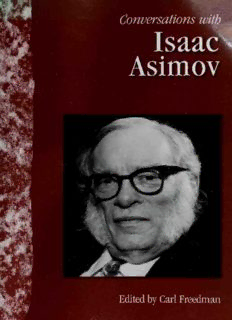Table Of ContentDigitized by the Internet Archive
2015
in
https://archive.org/details/isbn_9781578067381
Conversations with Isaac Asimov
Literary Conversations Series
PeggyWhitmanPrenshaw
GeneralEditor
Photocredit;©Photofest
Conversations with
Asimov
Isaac
Edited by
Carl Freedman
UniversityPress ofMississippi
Jackson
—
www.upress.state.ms.us
TheUniversityPressofMississippiisamemberofthe
AssociationofAmericanUniversityPresses.
Copyright© 2005byUniversityPressofMississippi
All rightsreserved
ManufacturedintheUnitedStatesofAmerica
Firstedition2005
@
LibraryofCongressCataloging-in-PublicationData
Asimov,Isaac, 1920-
—
ConversationswithIsaacAsimov/editedbyCarlFreedman. 1sted.
—
p.cm. (Literaryconversationsseries)
Includesbibliographicalreferencesandindex.
—
ISBN 1-57806-737-5 (alk.paper) ISBN 1-57806-738-3 (p—bk. : alk.paper)
1.Asimov,Isaac, 1920 Interviews.2.Authors,American 20thcentury
—
Interviews.3.Sciencefiction Authorship.I.Freedman,CarlHoward.
II.Title.III.Series.
PS3551.S5Z465 2005
813'.54—dc22 2004061197
BritishLibraryCataloging-in-Publication Dataavailable
Contents
Introduction vii
Chronology xix
Books by IsaacAsimov xxi
Science Fiction: The NewMythology ThomasD. Clareson 3
IsaacAsimov: Man of7,560,000Words LewisNichols 14
Untitled Interview from Words and TheirMasters Israel Shenker 18
A Conversationwith IsaacAsimov Earl G. Ingersoll 21
An Interviewwith IsaacAsimov James Gunn 34
—
The PlowboyInterview: IsaacAsimov Science, Technology and
. . .
Space! PatStone 56
IsaacAsimov Darrell Schweitzer 74
Science andAmerican Society FredJerome 85
A Conversation with IsaacAsimov FrankKendig 95
IsaacAsimov: Modern-DayRenaissance Man Joy Walsh 105
The Leading Edge VictorSerebriakoff 108
From“Nightfall”to Dawn: Asimov asAcrophobe Alan C. Elms 120
IsaacAsimov Speaks BillMoyers 130
IsaacAsimov Interview JrvBroughton 146
IsaacAsimov, Science FictionVirtuoso, Dies Myrna Oliver 163
Index 167
Introduction
IsaacAsimovwas one ofthe most popularAmerican authors ofthe twentieth
centuryand quite possiblythe most prolific. Furthermore,whereas most
extremelyprolific authors tendto concentrate their efforts almost exclusively
on a single kind ofbook (Agatha Christies detective novels, Louis L’Amour’s
Westerns),Asimovspanned manygenres as well as individualtitles. He
wrote mysterystories andbawdylimericks, satire and autobiography. This
life-long atheistwrote more than halfa dozen books about the Bible, and this
intellectualwhose originalyouthful ambition was to become an academic
historianwound up writing nearlytwentybooks ofhistory. He published a
quite successful two-volume companion to Shakespearean drama and copi-
ouslyannotated editions ofliteraryclassicsbyMilton, Swift, and Byron. Of
course, not all ofAsimov’sworkis ofequalvalue; a good deal ofunevenness
is inevitable in alifetime output measured in the hundreds oftitles. But I
have never encountered anAsimovtext that I foundwithout interest. For one
thing,Asimovmastered almost from the start the“simple”ability (ifitwere
trulysimple, itwouldbe much morewidelydisplayed than it is) to engage
the reader’s attention,to write prose in such awaythat the reader, regardless
ofhis or her previous attraction to the subject-matter,wants to keep turning
the pages.
The greatbulkofAsimov’s workfalls into two distinct but not unrelated
genres: science fiction and popularsciencewriting.And it is his contributions
to these fields that, on the whole, account forhis place in literaryhistory.
Asimov’s first fame was as a science-fiction author, and his involvement
with the genre endured from childhood until old age.As a childworking in
his family’s Brooklyn candystore,Asimovwas irresistiblyattracted bythe
rackofpulp magazines that the store offered for sale. He was especiallyfasci-
natedbythe science-fiction magazines that entered the literarymarket-place
when Hugo Gernsbacklaunched the pioneeringAmazingStories in 1926;
and, growing up in the 1920s and 1930s,Asimovbecame a member ofthe
first generation ofreaders who thought ofthemselves as science-fiction fans.
viii Introduction
Theywere an unusuallythoughtful and intense group,as readers ofthe pulps
went; and theytended to thinkoftheir favorite genre as central to their lives
in ways that readers ofcrime fiction orWesterns generallydid not.Asimov
was one ofthe manyfans ofhis erawho attempted to make the leap from
reader to writer; but he made it with nearlyunparalleled success. Hewas a
published author ofscience-fiction stories before hewas out ofhis teens.
Asimovs first stories were published in 1939,just two years after JohnW.
Campbell,who became the most legendaryscience-fiction editor ofall time,
—
took over the editorship ofAstounding which, thanks to him,became the
most consequential ofall the science-fiction pulps. Campbellwas determined
to raise the qualityofpulp science fiction from its hitherto abysmal literary
(and scientific) standards, and to this end he recruited a cohort ofauthors
who, under his leadership, effectivelyremade the genre. No onewas more
central to Campbell’s project nor more fiercelyloyal to Campbell personally
than Asimov.Alongwith such other authors as Lester del Key, Robert
Heinlein, HenryKuttner, C. L. Moore, Clifford D. Simak,Theodore Sturgeon,
andA. E.vanVogt,Asimov, almost immediatelyupon his arrival on the
scene,was moving in the forefront ofthe field. But it soonbecame evident
thatAsimovwas more, even, thanjust one member ofa talented group. By
—
the end ofthe 1940s the decade that sawmagazine publication ofhis first
robot stories and ofmost ofthe material that later made up the Foundation
—
trilogy Asimovwas securelyestablished as one ofthe“BigThree”ofscience
fiction: alongwith Heinlein andvanVogt at first, and later, as vanVogt’s pro-
ductivitywaned, alongwith Heinlein and the British authorArthur C.
Clarke. In terms ofgeneral popularity,Asimov, Heinlein, and Clarke never
losttheir status as the BigThree.
In literary-critical terms, however, science fiction underwent further
changes that mustbe understood in order to appreciateAsimov’s place in the
historyofthe field.AsAsimovand his colleagues in the Campbell cohort
remade and re-invigorated science fiction in the 1940s, so in the late 1960s
and 1970s another (more looselyassociated) group ofwriters redefined the
—
genre again. Thesewriters such as Philip K. Dick, Ursula Le Guin, Samuel
—
Delany,Thomas M. Disch, Joanna Russ, and others were far more rooted in
modern literature (and, sometimes, modern philosophy) than earlier
science-fiction authors hadbeen, and theytended to be considerablymore
ambitious and accomplished as stylists and as explorers ofpsychological and
politicalproblems. In a fieldthathad usuallybeen characterizedbyserviceable
Description:Isaac Asimov (1920–1992), one of the most popular and influential American authors of the twentieth century, sparked the imagination of generations of writers. His Foundation trilogy paved the way for science fiction that was more speculative and philosophical than had been previously seen in the

